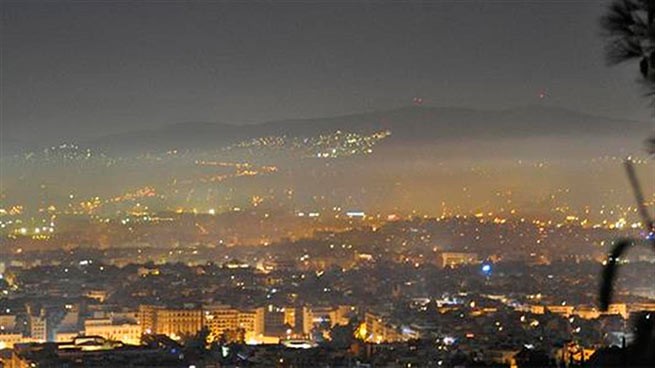A walk through evening Athens, bathed in yellow light, will give the passerby pleasant moments… And only the smoke screen spread across the city will cause slight bewilderment. Fire? Arson? Protest? In this city you can expect anything. And only then, after a while, comes the correct guess – fireplace smoke.
According to experts, the residents of Athens have been “thrown back” 30 years in terms of air quality in the metropolis. Smoke from fireplaces and wood stoves, as well as pollutants from vehicles, are largely responsible for an estimated 10,000 premature deaths a year in Greece, according to an annual report from the European Environment Agency. The Mediterranean country ranks 3rd in Europe in terms of the influence of air pollution on diabetes (60.7 YDL per 100,000 inhabitants) and 16th place in chronic obstructive pulmonary disease (35.5 YDL per 100,000 inhabitants).
The real cold has not yet arrived, but the residents of Greece feel the need for heating. Excluding, of course, those who this year, purely for financial reasons, will put on warmer socks and wrap themselves in a woolen blanket. The rest, saving on diesel fuel, heat their houses with wood. Some lighting a fire in a fireplace, some in a potbelly stove.
Greek buildings, not adapted for the cold, are very thin, and freeze with the first drop in temperature. Hence the intense heating. True, carbon compounds as a combustion product that escape into the atmosphere are not at all useful. From below, the severity of polluted air is almost not felt, but at an altitude of 500-1000 meters, microscopic soot particles really complicate the breathing process. Greek scientists are sounding the alarm, saying that in combination with rain, combustion products create a truly suffocating atmosphere.
The average daily level of PM 2.5 at the beginning of January 2024 in Athens is 10-15 μg/m3, with peak values up to 25 µg/m3which is 4 times higher than normal.
According to Nikos Michalopoulos, a researcher at the Institute of Environmental Research and Sustainable Development at the Athens Observatory, the main sources of these particles come from human activities. “There is also a part that is naturally occurring, naturally, but most of it comes from humans. Mostly it is combustion, for example in industry, cars, using solvents and so on.” Although the air in Athens is not “crystal clean”, in the case of microparticles the improvement is significant, and this is due to three main reasons: “Firstly, the deindustrialization that has occurred in Athens, that is, the fact that large industries have left and around Athens no longer has energy production and industrial activity. The second reason is all the projects that have been done, such as the metro, and the third is that the old car fleet has stopped moving and is being replaced by newer cars with lower emissions.”
Despite the progress made, a pattern persists of deteriorating air quality in the winter months: “The big problem in Athens is still winter. In Athens in the summer, as we observe in our measurements, the values drop below 10 µg/m3 and hover around 9, which is considered one of the very good values. A big problem is winter, when the readings exceed 20 µg/m3. In fact, they are in the range of 20-25 µg/m3, mainly due to heating, especially fireplaces.
Situation with NO2at a norm of 2 mg/m 3, in Athens it is regularly exceeded to levels of 72-100 mg/m 313-20 times higher than normal.

Fireplaces kill as many people as car exhaust
According to experts, the residents of Athens have been “thrown back” 30 years in terms of air quality in the metropolis. Smoke from fireplaces and wood stoves, as well as pollutants from vehicles, are largely responsible for an estimated 10,000 premature deaths a year in Greece, according to an annual report from the European Environment Agency. The Mediterranean country ranks 3rd in Europe in terms of the influence of air pollution on diabetes (60.7 YDL per 100,000 inhabitants) and 16th place in chronic obstructive pulmonary disease (35.5 YDL per 100,000 inhabitants).
According to the European Environment Agency environmentin 2021 in 27 countries EU 500,000 people died prematurely from air pollution. This was due to exposure to fine PM 2.5 particles that exceeded the World Health Organization’s recommended level of 5 micrograms per cubic meter of air.
New data on the impact of air pollution on the health of Greeks comes from the European Environment Agency’s annual report, which was published today. According to the report covering 2020, about 8,800 people died prematurely in Greece due to rising levels of particulate matter in the atmosphere, about 1,900 due to rising nitrogen dioxide concentrations and 920 due to excess ozone levels. The maximum values for these substances are 5 µg/m3 for suspended microparticles, 10 µg/m3 for nitrogen dioxide and 70 µg/m3 for ozone.
The main sources of air pollution in urban centers in Greece are traffic and heating. “In winter, the most important source is heating, namely the combustion of biomass, that is, fireplaces and stoves,” explains Nikos Michalopoulos, director of the Institute of Environmental Research at the National Observatory of Athens. – This phenomenon appeared 15 years ago, at the beginning of the financial crisis, and is still strong. Pollution from biomass burning has brought us back to pollution levels of 35 years ago, in some cities comparable to Asian countries. I’m afraid that this year the situation will be even worse, since people, not having money to pay for fuel oil, have again switched to firewood.”
According to the European Environment Agency environmentin 2021 in 27 countries EU 500,000 people died prematurely from air pollution. This was due to exposure to fine PM 2.5 particles that exceeded the World Health Organization’s recommended level of 5 micrograms per cubic meter of air.
New data on the impact of air pollution on the health of Greeks comes from the European Environment Agency’s annual report, which was published today. According to the report covering 2020, about 8,800 people died prematurely in Greece due to rising levels of particulate matter in the atmosphere, about 1,900 due to rising nitrogen dioxide concentrations and 920 due to excess ozone levels. The maximum values for these substances are 5 µg/m3 for suspended microparticles, 10 µg/m3 for nitrogen dioxide and 70 µg/m3 for ozone.
The main sources of air pollution in urban centers in Greece are traffic and heating. “In winter, the most important source is heating, namely the combustion of biomass, that is, fireplaces and stoves,” explains Nikos Michalopoulos, director of the Institute of Environmental Research at the National Observatory of Athens. – This phenomenon appeared 15 years ago, at the beginning of the financial crisis, and is still strong. Pollution from biomass burning has brought us back to pollution levels of 35 years ago, in some cities comparable to Asian countries. I’m afraid that this year the situation will be even worse, since people, not having money to pay for fuel oil, have again switched to firewood.”







More Stories
Black swan in the Evros river delta
The weather will turn bad on Good Friday
Crete "shaking" – two earthquakes this morning